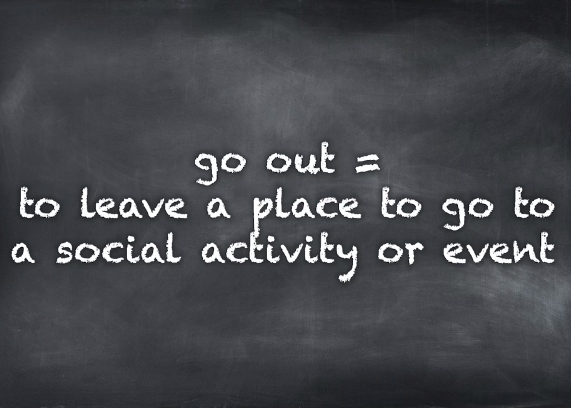This is Everyday Grammar. I'm John Russell.
这里是《每日语法》节目。我是约翰·罗素。
If you are like many American teens, you like to spend time with friends.
如果你像很多美国青年一样,喜欢花很长时间和朋友待在一起。
Maybe you go to the movies, a cafe or a park.
可能是去看电影,去喝咖啡,或者去公园。
There is a phrasal verb that can be useful for talking about such visits - go out.
有一个短语在谈论这种出行时非常有用——go out。
First, let's go to the blackboard.
首先,我们来看黑板。
A phrasal verb has a verb and a particle.
动词短语由一个动词和一个小品词构成。
Together the verb and particle make a kind of idiomatic expression.
动词和小品词一起构成了一个习惯用语。
It means something more than what the individual words suggest.
它不再是单个单词所表达的意思。

"Go out" can have a few different meanings,
“go out”有几种不同的意思,
but English speakers often use it to mean that they are leaving a place to go to a social activity or event.
但英语母语者经常用它来表示从一个地方离开去往一个社交场合或活动。
You might hear people use "go out" in a question, as in:
你可能还会听到大家在问句里使用“go out”,比如:
Do you want to go out on Friday?
周五你想出去玩吗?
Are you planning to go out this weekend?
这个周末你有计划出去吗?
Why do you not want to go out?
你为什么不想出去?
And you might also hear people use it in the past tense as well, as in:
你也会见到人们在过去时态的句子中用到它,比如:
Last weekend, we went out to the ball game.
上周末,我们去看了球赛。
Last week, they went out every night.
上周,他们每晚都出去。
You can think of "go out" as a kind of social phrasal verb.
你可以把“go out”看作是一种社交动词短语。
Social people go out.
社交人士出去。
Now, after you finish studying grammar, you should be sure to go out and have fun!
现在,在你完成学习语法后,你应该出去开心一下!
And that's Everyday Grammar.
以上就是今天的《每日语法》。











